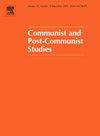作为意识形态的反共主义
IF 1.3
4区 社会学
Q3 INTERNATIONAL RELATIONS
引用次数: 4
摘要
本文旨在以当代波兰为例,展示反共的意识形态功能。它解释了“共产主义”是如何被构建和利用的,主要是为了在1989年后的几十年过渡中使政治/经济权力合法化。问题不仅在于为什么反共作为霸权意识形态相对成功,还在于它的局限性是什么。本文考察了反共思想的根源,试图找到其普遍性和特殊性。波兰的例子有助于区分在其框架内运作的主要、矛盾的意识形态解释:道歉和质疑。本文章由计算机程序翻译,如有差异,请以英文原文为准。
Anti-Communism as Ideology
The aim of this article is to show with the example of contemporary Poland the ideological function of anti-communism. It explains how “communism” has been constructed and utilized mainly in order to legitimize the political/economic power in the decades of Transition after 1989. The question is not only why anti-communism has been relatively successful in functioning as the hegemonic ideology, but also what its limits are. This article examines the roots of anti-communism with an attempt to find its universal and particular features. The Polish example is helpful to distinguish major, contradictory, ideological explanations operating within its framework: apologetic and contesting.
求助全文
通过发布文献求助,成功后即可免费获取论文全文。
去求助
来源期刊

Communist and Post-Communist Studies
Multiple-
CiteScore
1.90
自引率
0.00%
发文量
23
期刊介绍:
Communist and Post-Communist Studies is an international journal covering all communist and post-communist states and communist movements, including both their domestic policies and their international relations. It is focused on the analysis of historical as well as current developments in the communist and post-communist world, including ideology, economy and society. It also aims to provide comparative foci on a given subject by inviting comments of a comparative character from scholars specializing in the same subject matter but in different countries.
 求助内容:
求助内容: 应助结果提醒方式:
应助结果提醒方式:


